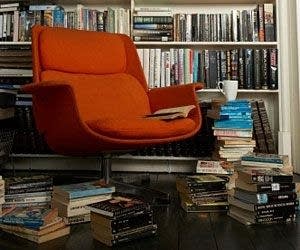Walker Art Center explores the art of reading

Starting Friday, the Walker Art Center's Open Field is offering you a place to read without distraction. At different times on five different days, you're invited to check into the Walker's "Field Office." There will be books, but you can bring your own, too. All you have to do is disconnect yourself from your wireless world and read.
[image]
If only we had more time...
Photo: Martin Poole
Create a More Connected Minnesota
MPR News is your trusted resource for the news you need. With your support, MPR News brings accessible, courageous journalism and authentic conversation to everyone - free of paywalls and barriers. Your gift makes a difference.
Chris Fischbach of Coffee House Press is the man behind the project. I caught up with him to find out more about the reading room; he says the idea came out of his own inability to make time for reading purely for pleasure.
I began to wonder, in a sort-of-silly, sort-of-serious way if it would be a tenable business model to open a space where people would actually pay to come and read. There would be comfortable chairs, great lighting, maybe some quiet snacks. And absolutely no talking, and no phones of any kind. A space for immersive reading.
Of course people can do all of this for free, but they don't. But if you placed a dollar value on it, it will be worth something to them, and maybe they will do it. Like paying to go to the gym. You can do the exercise for free, usually, but if you are paying, you're more likely to go.
Fischbach mentioned the idea to fried Sarah Schultz, who is one of the minds behind Open Field at the Walker Art Center. She convinced Fischbach he should give the project a dry-run this summer.
The difference between this Reading Room and my original idea is that Reading Room MPLS on Open Field is totally free. It's an experiment. It also puts a frame around the act of reading and, I believe, makes you think not only about the role reading plays in your life, but in the life of a community. You might ask how you read or why. You might wonder about the form of the book and its morphing form over the centuries. You might think about reading as meditating, or as something that incites anger. I want to see if people will, if given the gentlest nudge, actually take time to go somewhere and sit in a room, turn off their phone, and read. And what happens when a number of people gets together to do a solitary act in a group setting? Will this catch on, and will people start going to bars to read in groups?
Fischbach says while he's participating in the Walker event as an individual, he sees it as a natural outgrowth of his work at Coffee House Press.
As a publisher, we obviously hope that people read, and even better if they read a book by one of our authors. But in addition to publishing great books by great writers that get great reviews and are nominated for national awards, I am interested in Coffee House Press and our books as tools for social engagement, as tools for change, as tools for further art-making. The role of Coffee House doesn't stop once the book is printed. Why can't these words and our efforts have an active role in effecting change in our (or any) community? They should. I want people to think of Coffee House Press, our authors, and our books as community assets.
Ultimately, Fischbach says he would love to see "reading rooms" pop up all over the country, and for people to start seeing the act of reading as a creative act.
There is a quote I like, by Kurt Vonnegut, "Literature is the only art form in which the audience performs the score." I'm not sure about "only," but in essence, I agree. Reading is an ACTIVE act, not a passive act. I've always thought that. And any active act can be a creative act. I once saw a piece of graffiti outside of an art school in Amsterdam that said, "I will not draw as I am told." First, off, I'm not sure why it was written in English, but secondly, I think people should know that they don't have to read as they are told either. You might find great joy in reading a poem backwards. Or reading a page from one book and then a page from another, back and forth. What happens to your mind when you do that?
The "reading room" will be open in the Walker's Flatpak Field Office at the following times:
Friday, August 12 6:00pm - 8:00pm
Saturday, August 13 2:00pm - 4:00pm
(note: visitors to the Open Field on Saturday also have the opportunity to pitch their book idea to Coffee House Press in a literary version of speed dating)
Sunday, August 14 2:00pm - 4:00pm
Tuesday, August 15 12:00pm - 2:00pm
Wednesday, August 16 3:00pm - 5:00pm
I'm curious - how do you make time for reading? Would you be willing to pay for a place free of distraction, where reading was your only objective? What would it be like?